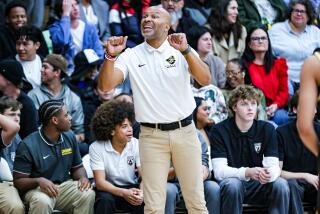Lapchick’s Center for the Study of Sport Counsels Athletes to Take Control of Life
- Share via
NEW YORK — When college athletic departments seem to run everything but foreign policy, and students deem football playbooks great works of literature, Richard Lapchick suggests it’s time to start over.
“The first time a parent doesn’t go to a PTA meeting and goes to their kid’s basketball game, that message starts to come through,” he says.
Lapchick is the director for the Center for the Study of Sport at Northeastern University in Boston. The group is in its third year and tries to raise critical issues facing sports.
The center acts as a clearinghouse for research and, through speakers and seminars, counsels students and athletes about drugs, education and the pitfalls of big-time sports.
More than 20 universities and scores of prominent athletes from Kareem Abdul-Jabbar to Doug Flutie to Mary Lou Retton are affiliated with the center. The center also allows athletes to complete college degrees if they failed to do so before turning professional.
But credit for academic work is often the least of problems facing those enrolled. For all the celebrity and macho posturing of many athletes, self-esteem is often in short supply.
“The greatest tragedy of the dumb jock culture is that the jocks themselves have come to believe they’re dumb jocks,” Lapchick says. “It’s the universal stereotype of the dumb jock that they’re treated differently no matter where they are. What we’re trying to do at the center is to empower those athletes to take control of their own destiny. The key is to never yield that responsibility.
“The first time a guidance counselor says, ‘OK, take shop, industrial arts,’ and a player says, ‘I want to take biology’ then we’ll really know we’re on the right track.”
Lapchick, the son of the late basketball coach Joe Lapchick, recites the grim statistics of athletics and academics the way some people reel off batting averages: 1 in 50 high school athletes earn a scholarship to play in college; 27% of Division I basketball players graduate; 1 in 12,000 youngsters make the pros.
In his book, “On the Mark: Putting the Student Back in Student-Athlete” (Lexington Books), Lapchick writes of Fred Buttler, a former football player at Cal State Los Angeles. .
Like many youngsters with an ability to catch footballs or crush quarterbacks, Buttler was pushed through the educational system. But by the time his eligibility ran out, he flunked out of CSLA with no degree, no pro offers and no job skills.
Later, he was involved in the accidental shooting death of his father. When he went to the cemetery to visit, he was at a loss. Buttler could not read the signs directing him to his father’s grave.
“You hear the cliche all the time, ‘Well, at least some of these guys are gonna make a career of it,’ ” Lapchick says. “This is the biggest bunch of bull. It’s a myth that’s been sold a thousand times.”
Among the many schools where it was sold recently was Southern Methodist. In a scandal reaching from school boosters to the Texas governor, SMU was hit by the toughest NCAA penalties against a football team. The school will not play football the next two years.
“It would take a college president a long time to raise the kind of money he can from a Final Four or bowl game,” Lapchick says. “Unfortunately, they look the other way. Nobody can tell me that a college president doesn’t really know what’s going on at his university.”
Lapchick says his group must scramble for money. He receives support from universities, the U.S. Olympic Committee and the major sports leagues, particularly the NHL. However, no ringing endorsements come from university booster groups.
More to Read
Go beyond the scoreboard
Get the latest on L.A.'s teams in the daily Sports Report newsletter.
You may occasionally receive promotional content from the Los Angeles Times.










